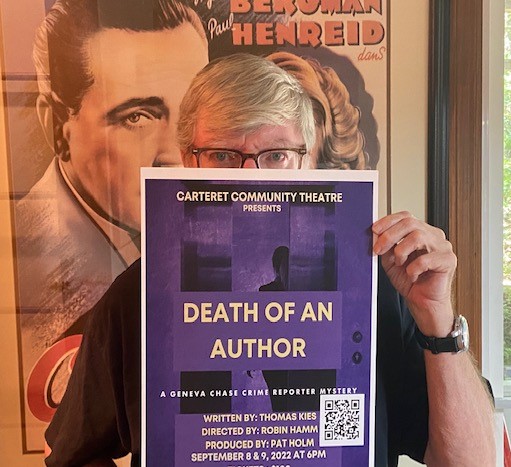The author falls to the ground, Geneva kneels next to him, gives mouth to mouth, then Mike starts chest compressions.
Finally, the two come back in the dining area and Mike announces: I’m afraid the Author is dead.
There’s a collective gasp from all the characters.
Cindy cries out: No!!
Mandy cries out: Oh, my God!
Cindy and Mandy hug each other.
Geneva: He was murdered, She’s holding his glass. She sniffs it and says. It smells like cyanide. Someone in this room killed the author.
Mike shouts: No one leaves this room. This is now an active crime scene.
Olmstead comes to the podium. Well, this was not how we had planned dinner. Olmstead looks at Mike Dillon. Should we continue to bring out the next course?
Geneva: I don’t know about anyone else, but I think we can conduct this investigation over dinner. Besides, I’m hungry. Turns to audience- Is anyone else hungry?
On September 8 and 9, the Carteret Community Theater is performing a dinner murder mystery at the Carteret Community College Culinary School as a fundraiser for the theater. The theater building itself was gutted during the disastrous days and nights of Hurricane Florence and the theater group is raising money in a capital campaign to rebuild the theater into something really special.
I was asked to write the murder mystery which I've entitled “Death of an Author.” It’s my first crack at writing a script.
No, I don’t play the author. We have an actor who plays me. Full disclosure, he looks a lot like me. We’re about the same age, we both wear glasses, and we both have beards…but in reality, he’s taller and better looking.
And yes, he dies as the entrée is being brought out. If he’s taller than me, he has to die.
The entire show is about trying to figure out who killed the author. The actors are all playing recurring characters from my Geneva Chase mystery series. Geneva Chase is being played by an extremely talented lady by the name of Kimberly Murdoch. She’s smart, savvy, and she’s appropriately being a smartass.
Assistant Chief of Police Mike Dillon is being played by a gentleman named Ken Hamm. And yes, he’s chewing the scenery and stealing scenes. He’s freaking hilarious.
They all are. This isn’t my typical dark murder mystery…this is a comedy. It’s entertainment.
At least I hope so. The actors are having a good time and it’s reassuring to see them all laugh at the appropriate lines.
It’s strange seeing my characters come to life and, to some extent, take on lives of their own. Actually, that’s part of the show. When the author dies, the characters go on. They now have self-determination, no longer being controlled by a puppet-master with an overactive imagination.
A little bit of Rod Serling that’s sneaking into the evening.
We’re in rehearsal and I’m in awe of how hard these men and women work, and that includes the director and producer. Because this is an ongoing process, I’ve forgone going to two mystery conferences, Killer Nashville, which was this past weekend, and Bouchercon, that takes place in Minneapolis the same weekend as the dinner theater.
The trade-off, however, is that we’ll have over a hundred people both nights who will attend and then I’ll get a chance to sell and sign books afterward. There’s no way I’d pass up an opportunity like that. I can think of no better way to launch my fifth book, Whisper Room.
Plus, this has just been a ton of fun!!!















